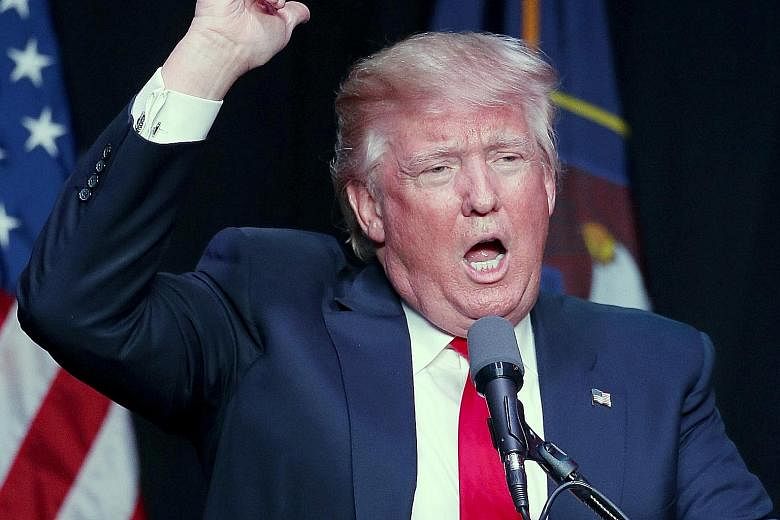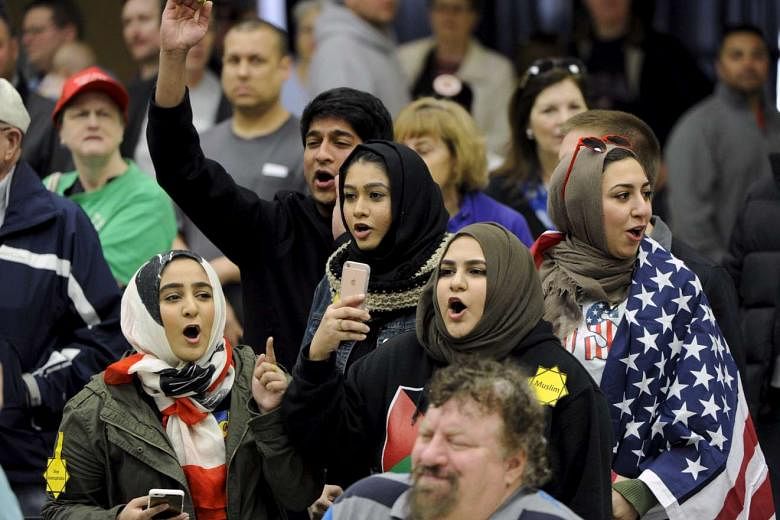Republican front runner Donald Trump may want to build a wall to keep Mexican illegals out, but for Asians, their greatest anxiety over the heated rhetoric coming out of the United States, is that Americans want to build a wall around themselves, whether in matters of trade or security.
An inward-looking US could withdraw some of its support for allies in the region, reverse trade pact gains that have created millions of jobs in Asia, and turn hostile to immigration.
Mr Trump has been the most strident voice against free trade pacts, but even Democratic front runner Hillary Clinton, faced with going head to head with him, and sensing the public mood, has questioned a pact she once championed - the Trans-Pacific Partnership (TPP), a 12-nation free trade deal that includes Brunei, Malaysia, Singapore and Vietnam.
Mr Trump, the 69-year-old real estate tycoon who has turned his name into a brand and pushed visceral buttons among the electorate, both on the right and left, and especially among the white working class, says the US is being "ripped off".
Repeating an emotive message that has drawn big crowds, he has won primary after primary and is firmly in front to win the Republican Party's nomination - unless factions in his own party, who want to stop him, succeed.
Mr Trump and Mr Sanders' rhetoric has resonated with many Americans, particularly blue-collar workers worried about stagnating wages and losing their jobs as a result of trade deals and immigration.
That same rhetoric is causing alarm bells to ring across Asia. Datuk Seri Nazir Razak, who chairs one of the region's top banks, CIMB, and is Malaysian Prime Minister Najib Razak's brother, posted a picture of Mr Trump on his Instagram account captioning it "The most dangerous man on earth".
The US turning anti-free trade is not good news for countries in the region working hard to free up trade to boost growth.
In 2013, US trade with the 10-member Asean, in goods and services, totalled US$241.7 billion (S$328 billion), the US Department of Trade says on its website. The US imported more from the region, at US$141.2 billion, than it exported to it. With Mr Trump promising to use tariffs and taxes to keep manufacturing jobs in the US, that trade surplus could be threatened.
The TPP for one thing, is supposed to be ratified by the US Congress this year; in the current mood, that outcome is far from certain - and any push back to the next administration would as good as kill it, analysts say.
"If the TPP is not done in this final term (of President Barack Obama), it will never be done," said Professor Simon Tay, chairman of the think-tank Singapore Institute of International Affairs. He said, however, that Mr Trump in his rhetoric "is merely amplifying the voices. And Clinton has had to respond by also questioning the terms of trade".
India's chief economic adviser Arvind Subramanian noted recently that Mr Trump's professed aim to implement visa curbs would be "very worrying" for India, whose software companies send thousands of engineers to the US annually.
What worries Asian countries about the backtracking on the trade deal is also what it will do to American influence in the region.
A Japanese Foreign Ministry official told national English-language daily The Japan Times: "If both candidates are looking backwards in the trade deal, how can the United States exert political leadership in the region?"
Indeed, the sense among many countries in the region is that the US under a Donald Trump presidency will lose the ground in Asia that it had regained under Mr Obama's pivot to Asia from 2009.
"If Trump wins the presidential race, don't be surprised if some US allies and friends start defecting to revisionist powers such as China, whose leaders would suddenly look less erratic and more reliable than the US'," said Mr Richard Javad Heydarian, a security expert at De La Salle University in the Philippines.
While Mr Trump has not spoken about the conflicts between China and its neighbours, including the Philippines, over the South China Sea, foreign policy analysts said he would likely withdraw the US military from Asia and wreck alliances with South Korea and Japan.
Certainly, Seoul is watching warily to see if Mr Trump will continue bashing South Korea for getting a defence "free ride" and paying "peanuts" for the 28,000 American troops stationed there.
Many have pointed out that Mr Trump's claims are not true. Seoul has a cost-sharing agreement with Washington to pay 920 billion won (S$1.07 billion) a year, which is about 40 per cent of its defence budget, to upkeep the US troops.
Some South Koreans have taken to social media to call him "Trimp", which combines his name and a Korean word for wrong.
Some analysts are worried that a Trump presidency could weaken the US-South Korea alliance and destabilise the Korean Peninsula.
Farther south, in the increasingly uncertain Taiwan Strait, the Taiwanese are asking if a Trump-led US will come to their island's aid if China becomes a threat. But this is balanced against Mr Trump's tough talk on China. "If the US doesn't get along with China, that's fine with us," says Professor Yen Chen-shen, a US expert at the National Chengchi University.
The Chinese themselves, however, are none too worried about Mr Trump's anti-China stance and netizens are saying they find him "frank" and "amusing". Many in China view the vitriol he has whipped up more as an indictment of the US than China, with some believing it is a precursor to American isolationism and downfall.
As for the Chinese government, it says it is not particularly worried about who becomes president. Premier Li Keqiang told journalists last week at a press conference: "We have more than a hundred mechanisms for dialogues and exchanges. If we are sincere in these and manage our differences, I believe we will continue broadening our mutual benefits."
For the rest of Asia, contending with a more assertive China, however, "at a minimum" they "have to be concerned", said Professor Thitinan Pongsudhirak, director of the Institute for Strategic and International Studies at the Chulalongkorn University in Bangkok.
•Additional reporting by Chang May Choon, Raul Dancel, Teo Cheng Wee, Walter Sim, Nirmala Ganapathy, Li Xueying
The candidates and Asia in quotes
MAKING SURE CHINA DOESN'T 'TAKE ADVANTAGE' OF U.S.
We're going to stand up for American workers, and make sure no one takes advantage of us, not China, not Wall Street and not overpaid corporate executives.
- MRS HILLARY CLINTON
KILL THE TRANS-PACIFIC TRADE PACT
I have a message for Secretary Clinton: We shouldn't renegotiate the Pacific trade proposal. We should kill this unfettered free trade agreement which would cost us nearly half a million jobs.
- SENATOR BERNIE SANDERS
ASIANS TAKING AMERICAN JOBS
They are taking our jobs. China is taking our jobs. Japan is taking our jobs. India is taking our jobs. It is not going to happen any more, folks!
- MR DONALD TRUMP
MUSLIMS NOT WELCOME IN TRUMP'S AMERICA
They're not coming to this country if I'm president. And if Obama has brought some to this country, they are leaving, they're going, they're gone.
- MR TRUMP, speaking about Muslims.
The Response
DON'T VISIT US , TRUMP, YOU'RE NOT WELCOME
Donald Trump's campaign showed his hatred and rage against Muslims. He considers us his enemy. Well since he rejects us, we will also reject him if he visits us.
- MR CHOLIL RIDWAN, Indonesian Ulema Council senior official
WHAT IS HE TRYING TO DO?
I don't understand Donald Trump. What is he trying to do? He shouldn't come out with that sort of statement.
- TENGKU ADNAN TENGKU MANSOR, secretary-general of Malaysia's ruling party Umno
NO WAY TRUMP WILL BE ELECTED
Donald Trump shows how shallow and nasty US politics (has become). He's not a leader at all. We don't have to worry because he won't be elected president.
- DR PAIK HAK SOON, Sejong Institute, Seoul, South Korea
FROM CLOWN TO DARK HORSE
The clown is now the biggest dark horse.
- CHINESE COMMUNIST PARTY-OWNED GLOBAL TIMES, on Mr Trump.
NOT JUST A JOKE ANY MORE
To start with they just thought 'he's funny'... but recently they're starting to worry - what happens if Trump wins?
- PROFESSOR MASATOSHI HONDA, professor of politics, Kinjo University, Japan
DRIVING U.S. ALLIES INTO CHINA'S EMBRACE
If Trump wins the presidential race, don't be surprised if some US allies and friends start defecting to revisionist powers such as China, whose leaders would suddenly look less erratic and more reliable than the US.
- MR RICHARD JAVAD HEYDARIAN, security expert, De La Salle University, the Philippines
Trump and Sanders agree on trade - and Asia is worried

That is, both are against it.
And that is a concern to observers in this region as many Asian economies rely on trade and are eagerly awaiting the ratification of the Trans-Pacific Partnership (TPP). The deal covering the United States and 11 Pacific Rim nations would slash tariffs and trade barriers for an enormous 40 per cent of the global economy and establish the largest free trade area in the world - if the US Congress passes it.
US election 2016: More stories online at: http://str.sg/Zjyq



